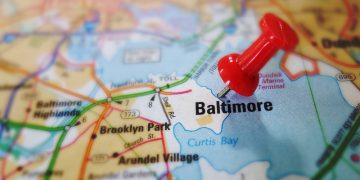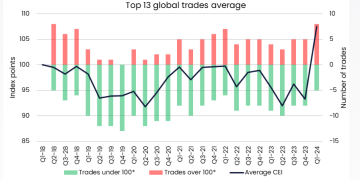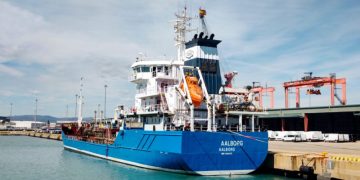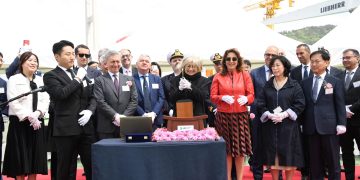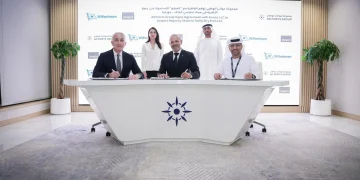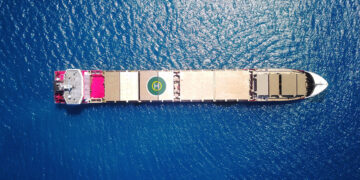The 2019 Hellenic American Maritime Forum gathered experts from the maritime industry, who provided their knowledge and expertise on critical matters that the industry is currently focusing on. One of the key discussions was about the approaching 2020 sulphur cap and the challenges around it.
What will be the greatest challenges in implementing IMO 2020?
 Georgios E. Poularas, CEO, ENESEL S.A.
Georgios E. Poularas, CEO, ENESEL S.A.
Regarding compliant fuels, a major challenge is the availability and compatibility. This also dictates other considerations that lead to technical problems that shipowners have to face; for example as regards to bunker management, suppliers’ history and evaluation, fuel analysis and most importantly, the monitoring of performance of critical machinery in order to avoid technical irregularities. Regarding the development of the LNG as a compliant fuel, a key issue is the rate of adoption from the shipowners and the shipyards in developing designs of mass production for LNG as a main fuel. In this respect, a critical factor and a challenge would be the networking of the LNG bunkering worldwide.
 Basil Sakellis, Managing Director, Alassia NewShips Management Inc
Basil Sakellis, Managing Director, Alassia NewShips Management Inc
All in all, I think that IMO 2020 is a major change in the way we are going to be operating our ships. From my point of view, there are three main challenges: the first concerns the proper preparation of our fuel oil tanks to receive compliant fuel. We have chosen the chemical solution, I think most of the people will; we’ve already started doing it on the most modern ships or those that have already been using such chemicals for other technical purposes in the past, since it is probably going to be a little more easier.
The second challenge refers to those who choose to install scrubbers; from a technical point of view and an approval point of view, I think it’s going to be extremely challenging.
The third issue has to do with the availability of compliant low Sulphur fuel, but also perhaps, availability of High Sulphur Fuel for those who have opt for scrubbers, given that there’s not going to be many of them.
 Kostas Vlachos, COO, Latsco Marine Management
Kostas Vlachos, COO, Latsco Marine Management
I believe that there are technical, illegal and commercial challenges. Regarding the technical challenges, it depends on the decision that each company has taken, either the company has selected to go for compliance fuel or has selected to install the scrubbers. For those who have decided to go with the solution of compliant fuel, the biggest challenge is the quality of the fuel that will be provided to the shipowner. In this case, there are two options: either resilient fuel or distillate fuel. However, their quality remains a question mark since we’re still waiting for the specifications from ISO. As a result, we are going for implementation, without exactly knowing what type of fuel will be burnt in our main engine and auxiliary engines. As prudent owners, we are trying to get some measures: we are trying to prepare a good Ship Implementation Plan or to produce a project execution plan, meaning that we know when to finalize the cleaning of the bunker tanks. Also, we are looking to have the possibility to change the fuel tanks between distillate and residual fuel, depending on what the type of fuel or the fuel that the charters will supply to us. Of course, we are going to test the 0.5% fuel, quite many times ahead of the implementation date.
Regarding the legal challenges, we are trying to convince our charterers that we shall implement the BIMCO clauses, however, it is not clear that everybody will apply the same clauses.
Regarding the commercial issues, it is uncertain where and what kind of fuel compliant we’ll find; if it will always be available and if FONAR will be a standard process that we’ll shall follow in the process of the ports.
 Dimitris Patrikios, CEO, Kyklades Maritime Corp.
Dimitris Patrikios, CEO, Kyklades Maritime Corp.
IMO 2020 is a hot topic that we all discuss, privately or publicly. Regarding our group, we have installed scrubbers in our new-buildings VLCCs and suezmaxes; we’ll retrofit 6 vessels with scrubbers in June.
For the vessels that we won’t install scrubbers, proper planning is a key issue; in this regard, we need to prepare a ship implementation plan, to clean the tanks and to speak with the charters because some of these vessels are time charters, so they should continue with the charter and burn the compliant fuel; this is another key challenge. When you have scrubbers on board, the availability of HSFO in all ports remains a big question mark. However, the availability of HSFO is something that is not being discussed too much and therefore for the operators that will continue to use HSFO, they must somehow plan very well their actions.
To face all these challenges, it is vital to be very proactive. Regarding the compliant fuel, we must train the people a lot, due to different kinds of fuel. Also, the compatibility will be an issue, as well as the quality and this is why we invest in training our people and be next to them in order to avoid any repercussions, as we had last year where we had vessels in the middle of the ocean because of bunker problems.
 Theo Baltatzis, General Manager, Technomar Shipping
Theo Baltatzis, General Manager, Technomar Shipping
We have decided 5% of our fleet to be retrofitted with scrubbers while the rest of the fleet to go for compliant fuel. The road to 2020 is certainly very challenging. Cleaning tanks is a nightmare to start with.
Since we have only 32 ships drydock this year, we have a certain policy; that is for each ship going into the drydock, we’re going to prepare with manual cleaning in the yard, minimum 3 tanks and we’ll seal them to be ready for compliant fuel. The reason behind it is that we’re going to give us some breathing space, towards the end of the year because we have an implementation plan, to try and burn compliant fuel with major container operators that we are chartering, towards the end of October.
That means we’ll give it a try by the end of October, in order to be ready and prepared for January 1, 2020, as they are very strict until the last day of the year, they want to burn the absolute everything of the HSF onboard the ship. So, this is a challenge.
What is happening to the rest of the ships that they haven’t got drydocking? Chemicals I think is the way out and I also hope that by the end of October, or at least November, to have at least three tanks clean and ready to receive compliant fuel.
We are facing extremely difficult problems with charterers because they don’t want to follow the BIMCO clause regarding fuel, so they want to play their own game and each guy has a specific clause on that particular aspect.
Last, technically speaking, defining the content of Sulphur in a fuel, itself is a problem and compatibility issues will be the major issue from 1st January 2020.
Above views were presented during a panel discussion at the Hellenic American Maritime Forum, 29-30 May, 2019, Megaron Athens, Greece, organized by SAFETY4SEA and SHIPPINGInsight.




